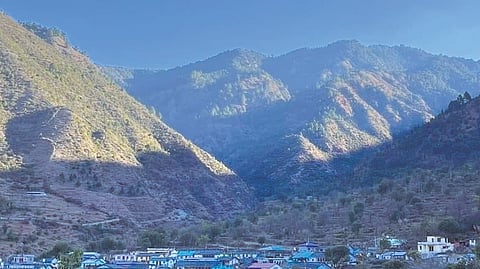

UTTARAKHAND: Uttarakhand, ‘the land of gods,’ is blessed with natural beauty. Nestled in the lap of Himalayas, this mountainous state is also infamous for ‘ghost villages’ — villages where inhabitants have abandoned them to earn a livelihood elsewhere. As per some estimates, the state is now home to nearly 2,000 such villages. This figure, according to the 2011 census, was 1,048. However, amidst this grim reality, there is a ray of hope for the future.
And, that shaft of light is Vimal Nautiyal, who has transformed his barren hamlet Ukhiyat in Tehri district into a model for reverse migration.
Vimal, after completing his graduation in hotel management in 2009, was set in his life, working with boutique resorts and five-star hotels as a pastry chef. His skills even took him to international shores, where he worked alongside top chefs, crafted exquisite pastries, and relished the finer things in life.
Yet, amidst the glamour, Vimal’s heart remained rooted in his hometown. Childhood memories of his native soil, its people, and traditions beckoned him to return. The lure of luxury couldn’t suppress the deep-seated connection he felt towards his community.
“I always felt a sense of responsibility towards my people and the land that nurtured me,” Vimal said, recalling the emotion that motivated him to come back to his roots.
“The comfort and success I achieved abroad couldn’t replace the satisfaction of making a meaningful impact back home”, he added.
But Vimal needed one last push to carve out a Swadesh-like path for himself. So, in 2020, when COVID-19 struck across the world and brought the whole world to a halt, he packed his bags and returned to his picturesque hamlet, where he had ancestral land.
He converted 15 nalis (one nali is equal to 240 sq yards) of barren land into a vibrant oasis, cultivating an array of crops and reaping unprecedented profits.
He planted and nurtured 1,000 apple trees, comprising Gala, M9, M11, Rootstock, and Jeromine varieties, alongside kiwi, pear, peach, plum, apricot and some medicinal plants.
In addition to the orchard, Vimal grows various seasonal organic vegetables, including capsicum, bottle gourd, cabbage, potatoes and garlic. “Selling the produce in local markets has yielded substantial profits, far exceeding my expectations,” Vimal revealed. This success has not only transformed his life but also inspired fellow farmers to adopt innovative farming practices.
Apart from having revivalist and entrepreneurial traits, he is also a humble person who likes to share his achievements with others. That is why he attributes a part of his success to Mangesh Ghildiyal, the then Tehri Garhwal’s district magistrate (DM).
“A chance encounter with Ghildiyal proved pivotal. His enthusiasm and backing helped me scale up the project and infuse life into my mission,” Vimal told this newspaper.
Vimal’s groundbreaking journey of reverse migration and self-employment has garnered recognition on multiple platforms. His achievements have been felicitated with prestigious awards, including the 2023 Pratibha Samman for Excellence in Horticulture at Jaunpur Mahotsav, Thatyud, and the 2024 Uttarakhand Sthambh Samman for Outstanding Contributions to Organic Farming and Self-Employment.
Inspired by Vimal’s success, several families in Buthkot, Bangsil, Mouldhar, and Bhuyasari have initiated horticulture and gardening projects in their previously barren fields. This grassroots movement is paving the way for self-employment and job creation. Vimal’s pioneering efforts have sparked a ripple effect, motivating others to replicate his model.
Notable among these enthusiasts are Shashikant Gaur from Bhuyasari, Narendra Mani Nautiyal from Mouldhar, and Harish Gaur from Buthkot, who have embarked on apple cultivation, embracing the potential of horticulture to transform their lives.
As more families join this initiative, the region is witnessing a resurgence in agricultural activity. The focus on horticulture and gardening has created self-employment opportunities, fostered entrepreneurship, enhanced local food security, and boosted rural economies. Vimal’s innovative approach has ignited a sense of hope and empowerment among rural communities.
By adopting sustainable farming practices, these individuals are not only improving their livelihoods but also contributing to the region’s ecological well-being. The Buthkot-Bangsil-Moldhar-Bhuyasari cluster is emerging as a model for rural development, demonstrating the power of community-driven initiatives.
The hills, long perceived as an insurmountable challenge, have been tamed by Vimal’s determination. His remarkable achievement serves as a shining example, demonstrating that with hard work and planning, success can be redefined. Vimal’s Ukhiyat initiative showcases the potential of rural innovation, debunking the notion that hilly regions are inherently limiting.
By harnessing the power of agriculture and horticulture, Vimal has created sustainable livelihoods, fostered community development, inspired a generation and proved that success knows no geographical bounds. As Vimal’s story unfolds, it becomes clear that the true measure of success lies not in the terrain, but in the unwavering commitment to one’s vision.
Inspired by APJ Abdul Kalam’s words, “Dreams are not what you see in sleep, dreams are something which do not let you sleep until you make them a reality,” Vimal Nautiyal transformed his vision into a tangible success story.